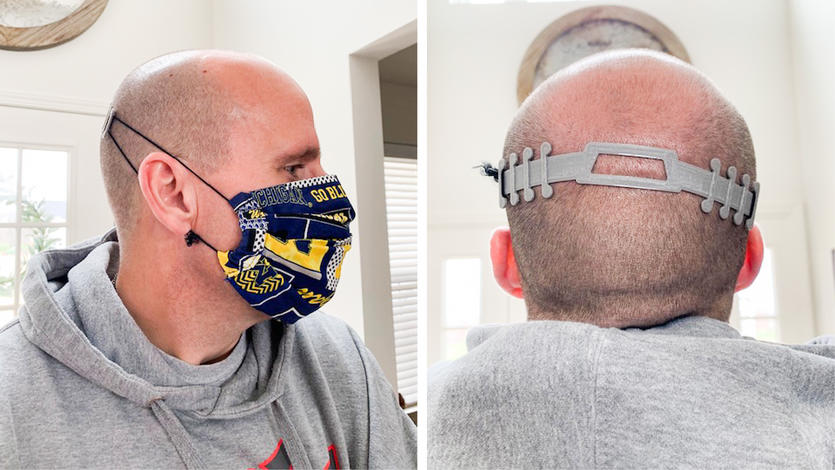
This article was originally published on April 29, 2020.
ECE Senior Electronics Technician Jesse Cross and MSEL Assistant Director Shawn Simone both have their assigned 50-pound MakerBot Replicator 3D printers running on their kitchen tables. Facilities Coordinator and Engineering Technician Faith Olson found a spot for hers in her living room. In his cozy 900-square-foot house, Senior Engineering Technician Matt Brown figured out the basement was the best place to muffle the printer’s regular “beeps and boops.” And Engineering Technician Josh Postell tucked his in a spare bedroom to keep it safe from his cat, which isn’t thrilled to be socially isolating with the microwave-sized robot.
Normally all of these 3D printers — and the staff running them — would be in CECS’s Manufacturing Systems Engineering Lab (MSEL). But when the pandemic hit, the team decided to relocate and repurpose the printers to remotely crank out hard-to-find personal protective equipment for frontline health care workers.
CECS Director of Facilities and Laboratory Safety Eric Kirk says it was actually an idea that originated with students. “We kept getting requests from students to try to do something with the 3D printers,” Kirk says. “And so we discussed what we might be able to make, and Shawn and Faith came up with the idea of moving all the printers remotely and assigning one to each technician.”
So far, the techs have been using them to make plastic head straps that reduce the strain from constantly wearing N95 masks. “They’re relatively easy to print, but this little headband has the most demand out of anything because nobody’s making these,” Kirk says. “We’ve gotten requests from U-M hospitals and even some external hospitals. They do a lot of good because when you hook them to a mask, the elastic straps on the N95s don’t cut into your ears.”

Each 3D printer can make a set of five head straps in about three hours, and the staff have them running pretty much around the clock. Kirk says he delivered the first several hundred head straps to Michigan Medicine last week, and the team is now looking into making other kinds of PPE, including protective face shields. Thirty of the first 100 of those will be donated to UM-Dearborn’s Department of Police & Public Safety.
“We basically have to see what there’s the most demand for and then figure out if we can manufacture it,” Kirk says. “Every time we turn around with this COVID-19 pandemic, some other need comes up. And that’s what’s special about our Maker Space on campus — and the talent of our technicians: They can adapt to whatever those needs are. Our impact is on a small scale, but it’s something we can do to help our community.”





